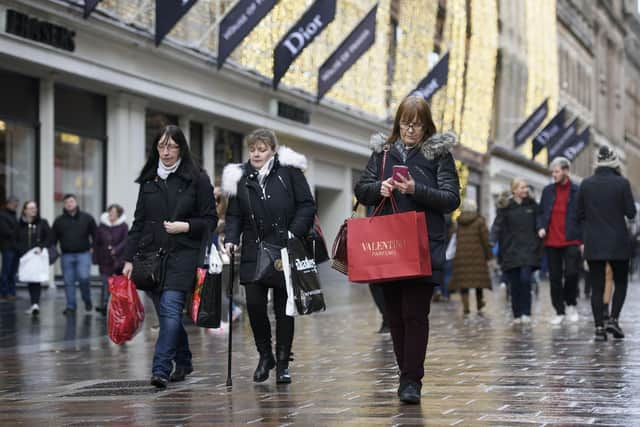Brits cutting back on new clothes and meals out as cost-of-living woes bite, Barclaycard data reveals
Consumer card spending grew 1.8 per cent year-on-year in September – the smallest uplift since February 2021, and well below the 9.9 per cent rise in consumer price inflation – as Brits cut back on discretionary purchases in response to rising living costs.
But the arrival of autumnal weather has encouraged Brits to spend more time enjoying evenings at home, resulting in a boost for at-home categories such as takeaways and digital content.
Advertisement
Hide AdAdvertisement
Hide AdData from Barclaycard, which sees nearly half of the nation’s credit and debit card transactions, reveals that spending on essential items grew 3.3 per cent compared to the same period in 2021 – the smallest rise this year.


This muted growth was largely due to supermarkets only seeing a small uplift (2.8 per cent), as well as food and drink specialist stores falling back into decline (-3.7 per cent) after a 0.6 per cent growth in August – a sign that consumers are being more selective about the essential purchases they make.
Spending on non-essential items grew one per cent year-on-year, significantly less than last month (3.6 per cent), and a new low since February 2021 (-17.5 per cent) when the second Covid-19 lockdown measures were still in place.
Clothing retailers, after falling into decline in August (-1.9 per cent), saw an even sharper drop in September (-4.1 per cent).
Advertisement
Hide AdAdvertisement
Hide AdRestaurant spend fell -12.2 per cent – further than last month’s drop of -11.4 per cent – while bars, pubs and clubs slipped into the red (-0.4 per cent) for the first time since March 2021.
Over half of consumers (53 per cent) say they are planning to cut down on discretionary spending so they can afford their energy bills throughout the autumn and winter, with the majority of Brits in this group cutting back on eating out at restaurants (60 per cent), buying new clothes and accessories (59 per cent), and drinking in pubs, bars & nightclubs (47 per cent).
The shift is already under way – with a 10.1 per cent rise in spending on takeaways and fast food.
Additionally, over two thirds (67 per cent) of Brits say they are looking for ways to reduce the cost of their weekly shop.
Advertisement
Hide AdAdvertisement
Hide AdOf these shoppers, 43 per cent are paying closer attention to the prices of items they buy regularly, 40 per cent are cutting down on luxuries or one-off treats for themselves, and 36 per cent are purchasing own-brand or value ranges in supermarkets.
Esme Harwood, Director at Barclaycard, said: “Consumers are taking a savvy approach to budgeting as they reduce spending on discretionary items and seek more value in their weekly shop, which is having a knock-on effect on retail and hospitality sectors.
“However, Brits are also looking for ways to enjoy themselves at home while saving money, which has led to growth across “insperience” categories such as digital subscriptions and takeaways. It is likely to remain a challenging time for many other sectors as consumers focus on essential spending and businesses continue to navigate inflationary headwinds.”